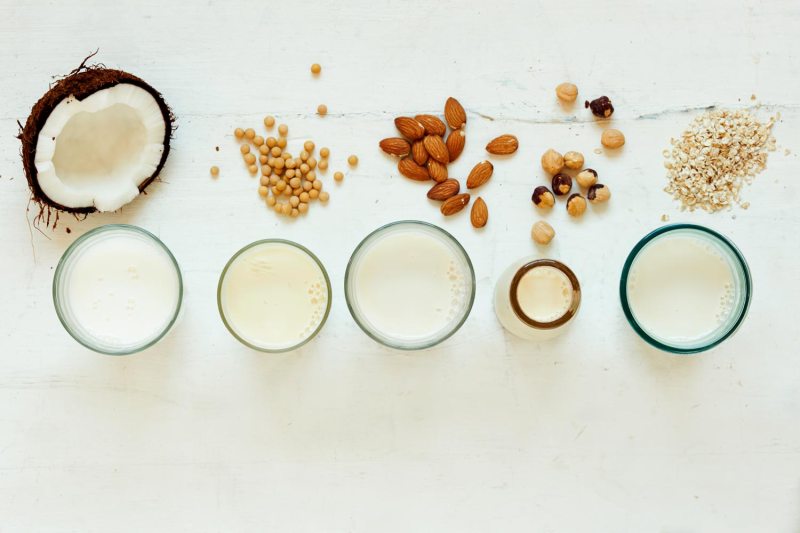
From coconuts to cockroaches, the world of dairy-free milk is vast. These days it’s hard to find something we haven’t tried to milk. Whether you have dietary reasons, ethical and environmental virtues, or just curious about all the hype surrounding plant-based milk alternatives, there are a plethora of versions on the market to try made from leaves, grains, nuts, and seeds.
In general, plant-based milks have less fat and every other nutritional element than dairy milk. Makes sense, since plant-based milks are predominantly water. The fat they do have, though, is mono-unsaturated (with some exceptions, as you’ll see), the kind that promotes cardiovascular health as well as great skin. They also bring more fiber to the party than dairy milk. It should go without saying that if you have an allergy to tree nuts, you’ll be limited to just a few of these plant milk options.
But the good news is that in today’s market, there are so many options that you’re guaranteed to find a plant-based milk that perfectly suits your taste as well as nutritional demands. It’s worth noting that not all plant milks are created equal.
Choosing which one is healthiest isn’t just about the milk base — it’s also about what kind of additives it includes. Depending on which brand you choose, you may find a large helping of added sugar, flavoring, and thickeners such as carrageenan, guar gum, or vegetable oil. Many also have their naturally occurring vitamin quotients boosted with added isolates of vitamin D or E so they can compete better with dairy milk.
But don’t worry — we’ve done our due diligence on your behalf. We’ve curated the most popular plant-based milks for 2022 and compared them based on their naturally occurring nutritional benefits. We’ve even included recommendations for the plant milks with the least amount of extra stuff, and even a few hints about the best ways to enjoy them.
Coconut Milk
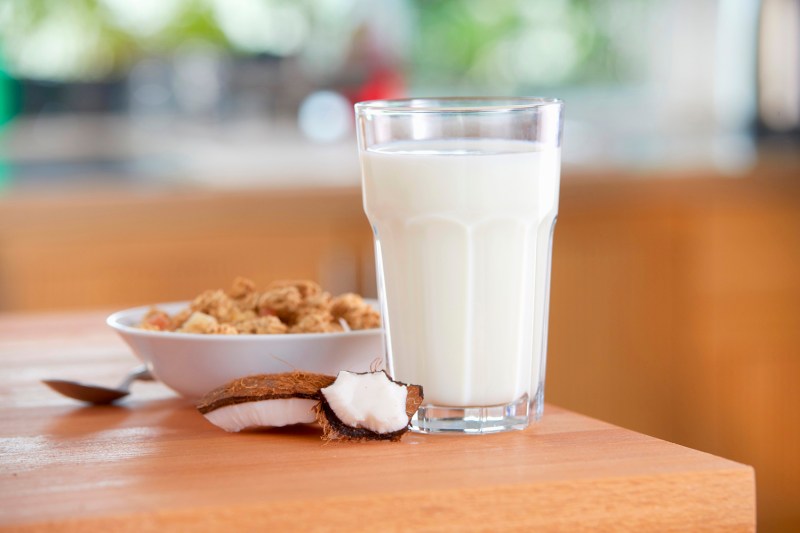
Health benefits of coconut milk? How much time do you have? Naturally sweet and creamy, this milk is a nutritional powerhouse. For one thing, coconut is one of the best dietary sources of or medium-chain triglycerides (MCTs), miracle fats that help you achieve a healthy weight by increasing metabolism, regulating appetite hormones, and increasing fat oxidation.
One perceived drawback of coconut milk is that it contains saturated fat. However, not all saturated fats are equal. The ones in coconut milk have been shown to significantly improve good cholesterol, reduce oxidative stress and blood pressure, and boost immune function. While coconut milk doesn’t have a lot of protein, it does have heaping helpings of manganese, potassium, magnesium, calcium, sodium — all-important electrolytes that support athletic performance, post-workout recovery, and longevity. Did we get everything? Probably not.
Our recommendation: So Delicious Coconut Milk is a great alternative for coffee creamer, or really anything where you’re looking for a hint of tropical without being too much.
Almond Milk
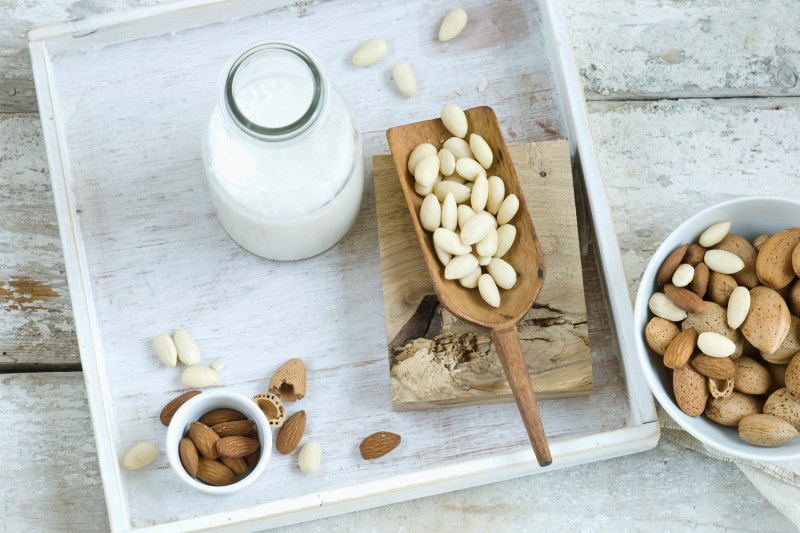
It’s commonly believed that almond milk is high in protein. In fact, the chief virtue of almond milk is its high dose of vitamin E, an antioxidant that combats inflammation and stress, helps protect against heart disease and cancer, and improves bone, eye, and brain health. It also has a lot of the mineral zinc, which keeps your skin glowing and prevents hair loss. The main drawback of almond milk is its environmental impact. Not only does almond cultivation require more than the average volume of water, but it’s typically done in places that can ill afford to consume that much water.
Our recommendation: Califia Almond Milk’s light flavor and rich density make for a deliciously refreshing mouthful; it’s also the perfect partner for warm chocolate chip cookies.
Cashew Milk
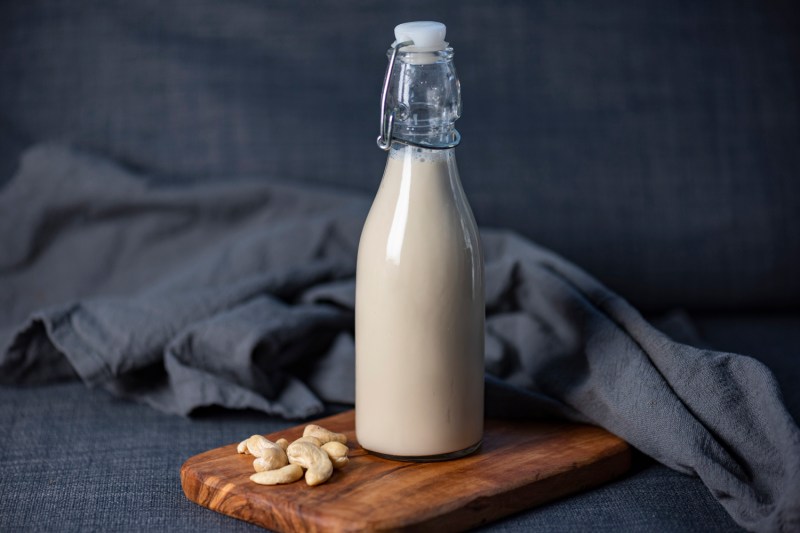
Like almond milk, cashew milk contains healthy fats, protein, and a variety of vitamins, and minerals. It’s particularly rich in magnesium and iron, as well as the antioxidants lutein and zeaxanthin, which prevent cataracts and macular degeneration to your eyes. Other unique benefits of cashew milk include extra vitamin K, which is vital for blood clotting; zinc, which boosts immunity; and copper, which plays a large role in keeping your skin healthy and youthful.
Our recommendation: Sweetened with dates and thickened with oats, Forager Project’s cashew milk is as natural and wholesome as it gets. Oddly enough, it was by far the best of the non-dairy option for making a plant-based White Russian.
Macadamia Milk
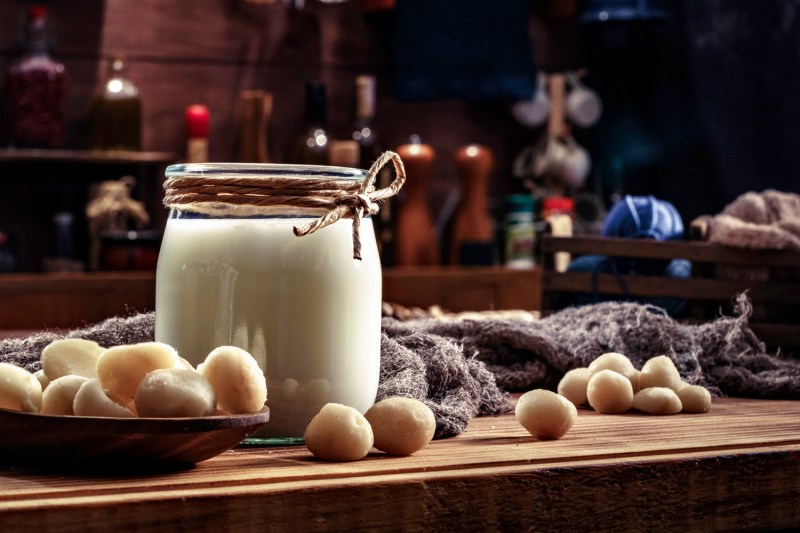
This fancy newcomer to the plant-based milk scene is packed with rich, delicious monounsaturated fat, the same type of fat as olive oil. But what olive oil doesn’t have as much of is a rare heart-healthy Omega-7 called palmitoleic acid. (The only other sources are cold-water fish and sea buckthorn berries. Macadamia nuts contain 14% to 22% palmitoleic acid.
Our recommendation: Milkadamia’s macadamia milk boasts a buttery richness and natural sweetness that elevates everything from your morning latte to your midnight bowl of Lucky Charms.
Pistachio Milk
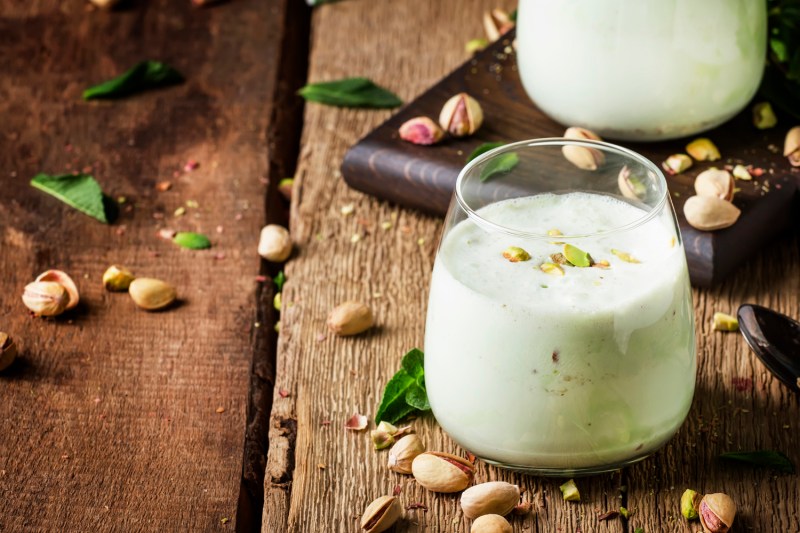
Pistachio milk is a high nutrient, high flavor plant milk. Pistachios are packed with potassium and vitamins K and B-6, monounsaturated fats and oleic acid, rich in antioxidant nutrients like carotenoids and phytosterols, and six grams of protein per ounce making them one of the highest protein cow milk alternatives.
Our recommendation: The Táche Pistachio Milk is designed specifically to complement warm beverages like coffee and matcha. It has a nutty, slightly sweet, and buttery flavor and an exceptional froth.
Walnut Milk
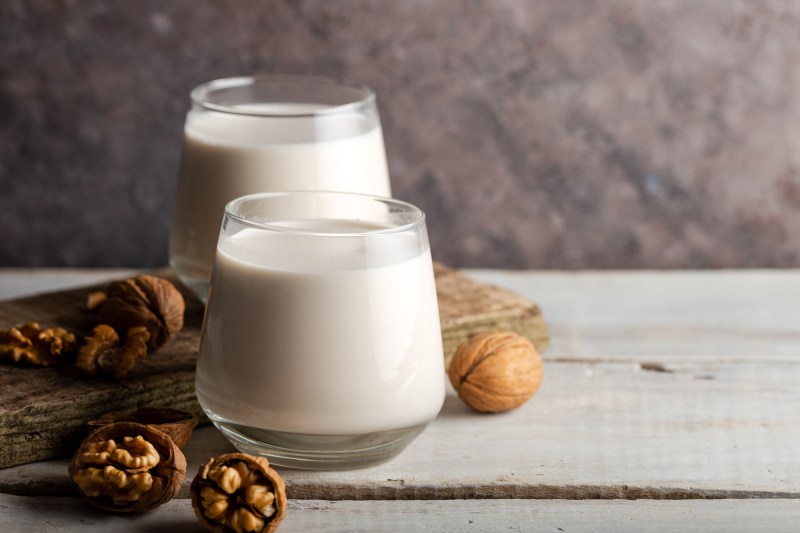
This plant milk is fiber-filled, low in carbs, high in fat and protein. Walnuts pack a healthy dose of omega-3s, antioxidants, and essential fatty acids that have been linked to boosting brain functions and promote gut health.
Our recommendation: The Elmhurst Walnut Milk uses simple ingredients and no additives for a real walnutty flavor and more nutrition. We suggest pouring this Omega-3-packed milk into your cup of joe or bowl of cereal.
Soy Milk
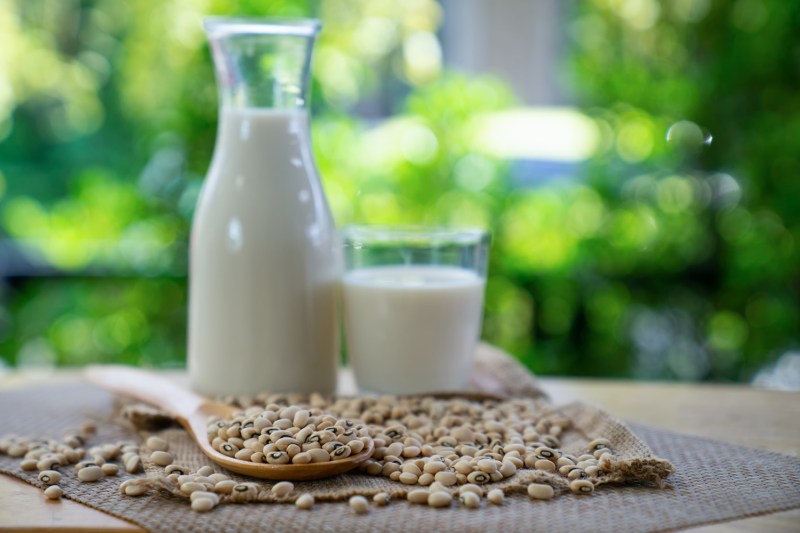
Soy milk was the darling of the 1990s for good reason — it’s plant-based milk that contains as much protein as cow’s milk, very little fat, and is a good source of vitamin A, potassium, and the elusive vitamin B-12 (hard to find outside of animal sources). If you suffer from high blood pressure, it’s a good idea to look for probiotic or fermented soy milk varieties.
In recent years soy milk has fallen out of favor, though, largely because most U.S.-grown soybeans come from genetically modified organisms (GMOs). While that’s much less true today, it’s also worth noting that a 2008 Harvard study Trusted Source showed that higher intakes of soy-based foods caused fertility problems and lower sperm counts. So if you’re a big milk drinker, you might be better off with a different type of plant milk.
Our recommendation: Silk is one of the OGs of the plant milk world. If you’ve seen soy milk out and about, chances are you’ve seen this bottle before.
Hemp Milk
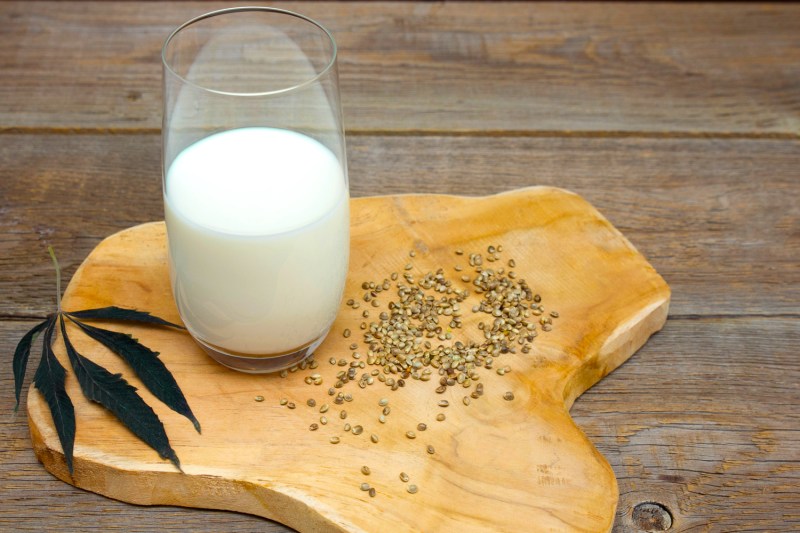
Believe it or not, hemp seeds are naturally higher in protein than beef, contain more calcium than milk, and have even less saturated fat than olive oil. Along with being a good source of magnesium, iron, zinc, and vitamin B1, hemp boasts Omega-3 and -6 fats in the ideal 1:3 ratio that promotes brain and heart health and is anti-inflammatory in the body. The protein in hemp seed is easy to digest and can even help repair DNA. Hemp is also one of the least processed types of plant proteins out there—it’s about as clean as you can get without chewing on a leaf.
Hemp milk isn’t just good for your body — it’s good for the earth. We’ve extolled hemp’s sustainability in the past, how it requires way less water than other crops (cough almonds cough), doesn’t require chemical fertilizer or soil additives to grow in abundance, and nourishes the soil rather than depleting it.
Our recommendation: The Tempt Hemp Milk from Living Harvest is a great place to start if you’re tempted to dive into the product. Packed with essential vitamins and minerals, it’s great on its own or used in place of regular milk.
Flax Milk
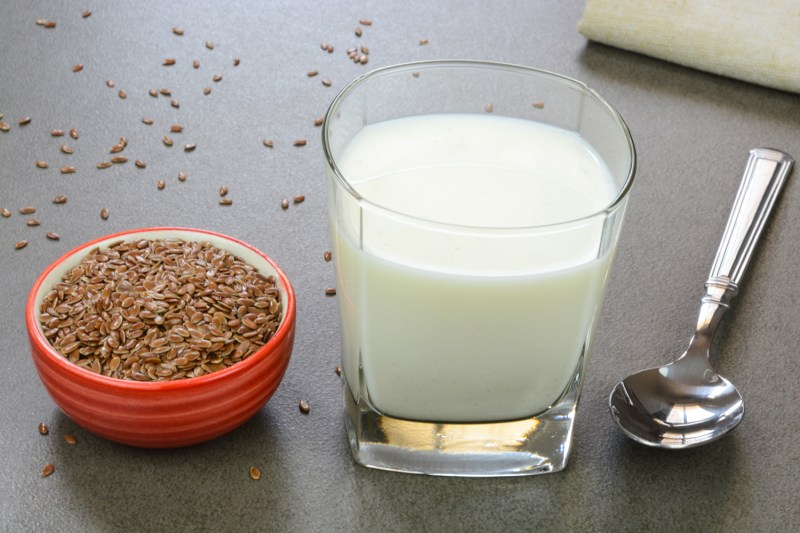
Flaxseed milk is filled with omega-3 fatty acids that are shown to prevent cancer, diabetes, heart diseases, and strokes. and offers vitamins A, D, and even B12, it offers both soluble and insoluble fiber. It’s also a great option for those who are allergic to nuts.
Our recommendation: Good Karma’s flax milk has a thick and creamy texture unusual for plant milk, and a taste that isn’t obviously “seedy.” Best enjoyed with overnight oats, smoothies, and cereal.
Rice Milk
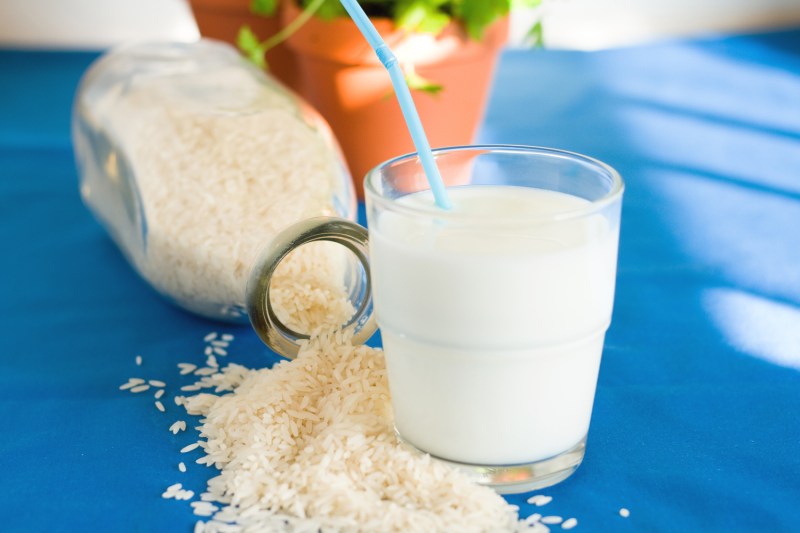
The great virtue of rice milk is that it’s the least likely of all of the plant-based milks to cause allergies. It’s naturally sweet, too, which means rice milk brands are a lot less likely to contain added sugar. On the downside, that natural sweetness comes from a big heaping helping of simple carbohydrates, which is pretty much the only nutritional element rice contains.
Our recommendation: Rice Dream’s Original Rice Drink is made from brown rice, giving it a slightly sweet flavor. Add to that a light body and you’re in for a sweet treat.
Oat Milk
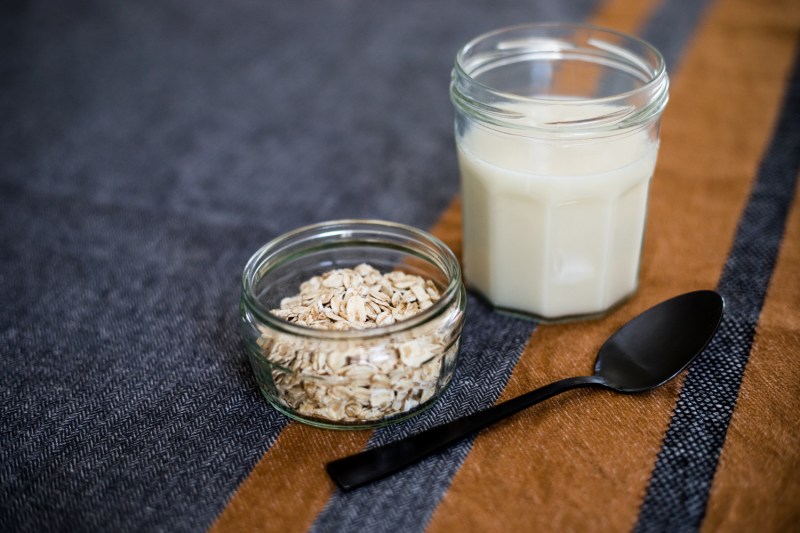
This plant milk is enjoying a spike in popularity, possibly thanks to America’s current obsession with all things Scandinavian. Oat milk deserves its hype. It has less protein than dairy or soy milk, but a lot more than other plant milks such as almond, cashew, coconut, and rice. It also contains the B vitamins thiamin and folate, and the minerals magnesium, manganese, phosphorus, zinc, and copper. Its higher carb quotient is offset by the presence of beta-glucans — a soluble fiber that binds to cholesterol and reduces its absorption. One study in men found that drinking about three cups (750 ml) of oat milk daily over 5 weeks reduced total blood cholesterol by 3% and “bad” LDL by 5%.
Also, because oats absorb water more easily than nuts, more of the actual oats wind up in the milk, giving the milk a creamier texture without added thickeners required. While oats themselves are gluten-free, they can sometimes be “contaminated” by other gluten-containing crops. If you have an issue with gluten, it’s best to purchase oat milk labeled as certified gluten-free.
Our recommendation: Oatly Oat Milk is a solid dairy substitute, and is great with PB & J. Another great oat milk brand is Rise Brewing, which has a toasted caramel flavor perfect for your morning cup of coffee. (Incidentally, they also make a canned nitro oat milk latte that is delicious.)
Quinoa Milk

This plant milk is gluten, nut, soy, and sugar-free, and also high in fiber. This easy-to-make grain milk has all the benefits of regular quinoa including essential fatty acids and vitamins like Omega-3 and Omega-6, potassium, calcium, phosphorus, iron, zinc, magnesium, and vitamins B and E.
Our recommendation: Make your own at home with this recipe from Well+Good. Feel free to add flavors like vanilla and cacao or keep it natural.
Sesame Milk
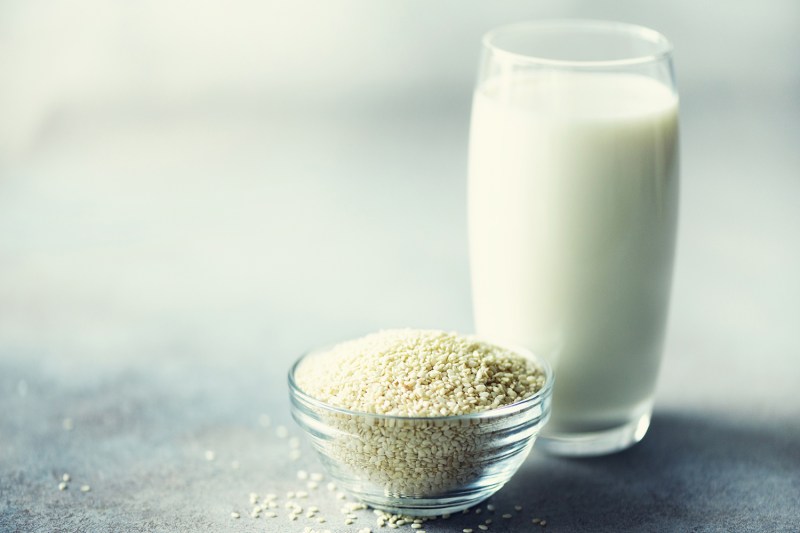
Sesame milk is a powerhouse of nutrients. This heart-healthy nut milk is a great source of plant-based protein, contains 8 grams of protein per cup and all nine essential amino acids. It’s creamier than other nut milk and with more vitamin D and calcium as well.
Our recommendation: Known for its signature nutty taste, Hope & Sesame’s organic sesame milk can protein-pack your coffee, hot chocolate, and all your favorite beverages with far less sugar than cow’s milk.
Banana Milk
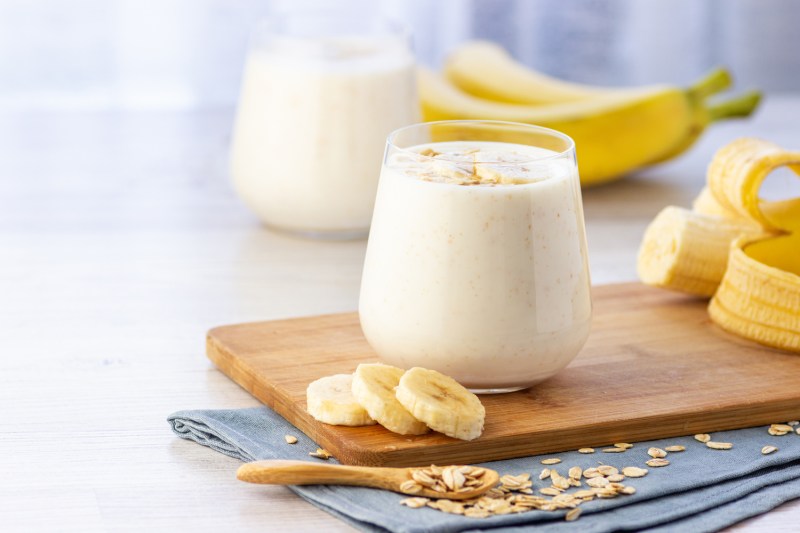
Banana milk is a sweet, tasty, vegan allergen-friendly milk with only 60 calories per serving with no added sugar. Banana milk is a good source of Calcium and Potassium from organic bananas, sunflower seeds, and flavored with a hint of cinnamon.
Our recommendation: Mooala has a market on banana milk and it’s amazing in smoothies, banana bread, pancakes, cereal, or just by the glass!
Pea Milk
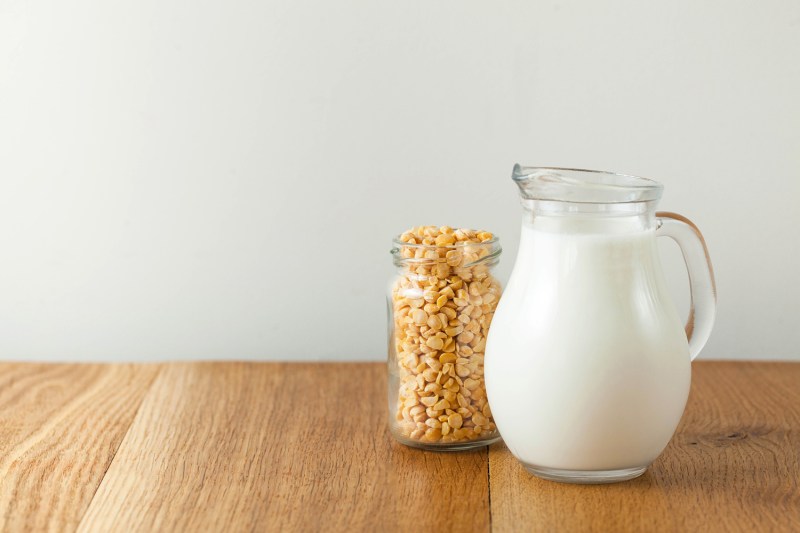
This relative newcomer to the plant milk scene surprisingly has about the same amount of protein as cow’s milk, as well as 50% more calcium. It’s high in potassium and provides a good source of omega-3s, vitamin D, and iron. We also appreciate the low environmental impact that pea milk involves. Why isn’t it green, you ask? Because pea milk is usually made from yellow peas.
Our recommendation: Ripple Pea Milk boasts a mild sweetness and a nice thick texture that we love for blending into smoothies (or milkshakes).




